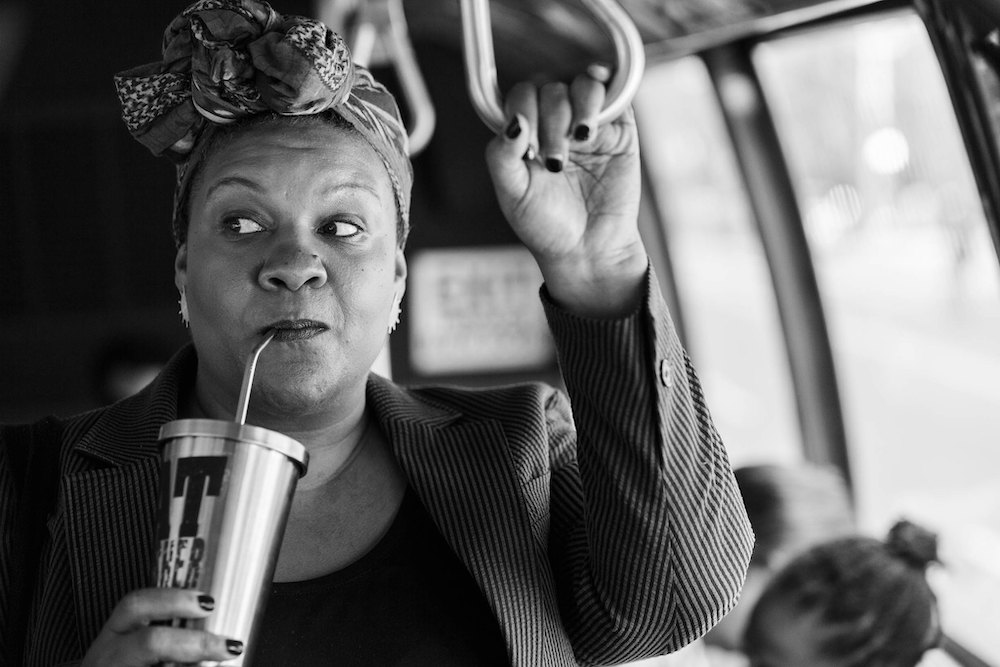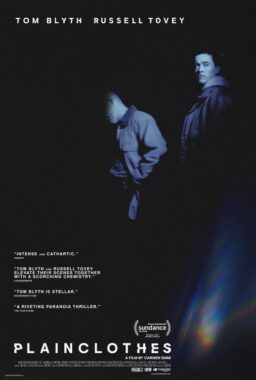Radha Blank stars as Radha in “The 40-Year-Old Version,” a black-and-white New York story where Blank takes her own experiences as a creative and turns them into a funny, often crowd-pleasing venture about a woman getting her talents out there. She’s an instructor for a playwriting class full of goofy but supportive teens, and also a playwright herself, having written a production about gentrification called Harlem Ave. She receives some help from her high school friend Archie (Peter Y. Kim), who is a bit more pushy on Radha changing up Harlem Ave. to appease a white theater owner who race-splains to Radha in the first act (in one of the movie’s victorious moments, she proceeds to fight him).
The stress of trying to make it as a 40-year-old playwright leads her to a previous form of self-expression that she used to be good at in high school, rapping. In one of Blank’s exciting narrative goals, she makes the story equally about the stakes of her play’s integrity just as much as the excitement of her becoming one of the rare honest rappers out there. Blank has an ease in front of the camera that makes for numerous big laughs, and sucks us into her journey to be heard.
“The 40-Year-Old Version” is up there with the best of the festival’s directorial debuts, in part because it plays out like a writer/director/actor putting everything they have on the page. It’s also an ambitious tale, balancing many characters and their respective arcs, creating a feel that’s more about ambling around Blank’s world (in a 125-minute movie) than getting a tight narrative. Blank is not just interested in showing off her own gifts, but others, as in a scene that takes Radha to a woman rap battle competition, and beholds different performers for the sole purpose of getting them time on screen.
But any major complaints about scene length, or about the story being pulled in different directions by characters, are answered by how deeply the film resonates. Blank proves throughout that she’s a multi-talented storyteller, and that you can’t imagine her vision would be any better with drastic compromise.

There is a lovely tenderness to Ekwa Msangi’s “Farewell Amor,” a movie comprised of three excellent performances and many quiet conversations between a newly reunited family of three. In the opening scene, daughter Sylvia (Jayme Lawson), and her mother Esther (Zainab Jah) reunite with their father and husband, Walter (Ntare Guma Mbaho Mwine). It’s a cause for celebration, as this Angolan family have been separated for 17 years, with Walter living in New York City. But it’s also an occasion of uncertainty, as everyone has changed over time, even though they have tried to keep in touch. Sylvia is quiet when settling into her father’s small apartment; Esther has become extremely religious. Walter, a cab driver, has his own secrets from when his wife was not physically in his life.
Msangi has a brilliant approach to showing us the intricacies in these three lives, following them with individual chapters. It allows us to see their days after the reunion, and also how they act when they’re not with each other. For example, Sylvia appears quiet and still when she first meets her father after so many years, but is actually bursting with a love for dance. Likewise Walter, in his chapter, is shown to have an excitement for dancing as well, going to a club but also meeting up with a woman he had known closely recently. Both of them try to understand Esther’s way of religion, while Esther faces uncertainty about her marriage.
On a larger scale, the chapter segmenting does provide a proper amount of time for arcs that would likely not be able to sustain their own feature films. It also helps the performances, which leave their deepest impressions in numerous delicate situations. A moment in which Walter takes Esther out for a romantic dinner is one of the movie’s highlights, showing the tension between each other, but also the sweetness. Mwine’s raspy, whispery voice is just one of the film’s many sensory experiences in a world lovingly created with dialogue and performance. Msangi’s film casts a spell with her lived-in script, so much that when her characters do reach emotional climaxes that aren’t uncommon at Sundance (like Sylvia’s dance competition) it feels to come from its own world.

Eugene Ashe’s “Sylvie’s Love” is an unabashed throwback to the melodramas of Douglas Sirk and others, while accompanied by a deep love for jazz music. It’s the kind of movie that will largely depend on how much you love its aesthetics, because the always impressive production design, costume design, and music play a big part in creating a period and also in making a predictable love story resonate longer than it normally would.
Tessa Thompson stars in the movie as Sylvie, a woman who works for her dad’s record store when she meets a handsome saxophone player named Robert (Nnamdi Asomugha). The film is largely about their relationship and connection throughout different years, as their first period involves the lates 1950s, and then the second half involves where they are (and who they are with) five years later. Robert has his own career that he’s trying to get off the ground as a saxophone player, and Sylvie is trying to make a name for herself pursuing her passion as a TV producer.
In a way that’s similar to how Todd Haynes approached melodrama with “Far From Heaven,” Ashe also tries to use the comfortable aesthetics to then tell a progressive story. Sylvie has that storyline about becoming a TV producer in the early 1960s, and the movie treats it as the non-question it should be. It even goes so far as to make Sylvie more self-aware than the previous characters she is inspired by, like when Thompson is seen reading The Feminine Mystique, the kind of text that could have saved numerous people in Sirk’s films. But this different take on history is very refreshing, especially as the story values the career of the woman in the relationship over the man’s.
“Sylvie’s Love” seems to discount that Sirk often challenged viewers, and it’s easy to get ahead of Ashe’s screenplay, especially as it doesn’t feature any large surprises with its on-and-off romance. But Thompson and Asomugha do strong work in filling the emotional core in “Sylvie’s Love,” a film that’s best taken as a welcome corrective, with the kind of grandiose emotional scenes that will always make for movie magic.












